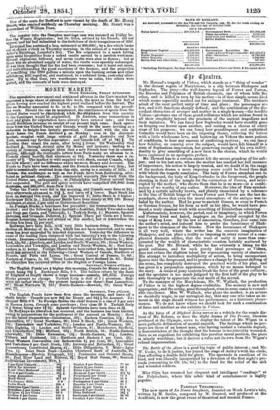iptatrto.
Mr. Heraud's tragedy of Videna which stands as- a "thing of wonder" in theedietant region of Marylebone, is a slip between Shakspere an& Sopheeles. The stery-Tthe well-known legend of Ferrel( and Porrex, the Eteocles and Polymees Of British chronicle, one of Whore kills the other, and is killed in turn by his mother-is of that simple severe kind which seems especially marked out for antique' treatment. The incidents admit of the most perfect unity of time and place ; the personages are few, and:iiith functions sharply defined; and the colubination of the gis- cordant characters of avenger and mother in a single-Verson-the terrade Videnaproduoes one of those grand collisions which are seldom found in all their simplicity beyond the precincts of the ancient tragedians and their imitaiors. We can fancy how Sophoeles would have steadily gone on hbapincone horror upon another, and resting on a chorus at every stage of his progrese; we can fancy how grandiloquent and sophistical Corneille woul4 have been on the imposing theme, relieving the horror with a little wholesome love, and bestowing ori Vide= the most patient of oolafidanta, to bear any amount of oonfliotiog. motives ; we can fancy how Schiller, on conning over the subject, would have felt himself in a state of Sophocleaninspiration, but preserving enough of his own indivi- duality-to give something of anew form to the chorus, which he would have explained in an apologetic preface. • --Mrirlieraud haste &certain extent felt the severe grandeur of his sob- jeet ; and in his last acts, where the mother has reached her full measure ofimportance his action is largely treated, and we doubt if in, the range of the modern drama a more imposing scene could be found than time with which the tragedy concludes. The-body- ofrEertex stretehed _pie in the background, the body of King Gorbudoc in the foreground, the people shouting in froot of the temple for the coronation of Porrox, and inter- iiipted by thitedtber, who-shows there that he is no more-ii a ecutibi- nation of wo worthy of any author. Moreover, the idea of Fate symbol- ized by a cerfilliitnluelty crown, and plainly enunciated by a' reference to the line Oftrrillsla kings of whom Emetic and Forret are the last de- scendants, shows that even the moral atmosphere of the antiqueires in hated b;y the author. Had he gone to ancient Greece, or event ter Frefich or-German Greece' for his form as well es his idea; he would,have pro. duced,a truly eine:deal work with something of Elizabethan colonring. .1srefertuaately, howeveruthe period, reel or imaginary, in which Ferrex and Porrex lived said hated, impinges on the period occupied by the reign of King into the , By the law of association, therefore, Lear came the author's mind,,and induced him to prefer the luxuriance of Shalt- spore to the closeness of the Greeks. Now the luxuriance of Shakspere is all very well, where the writer has the concrete imagination of Shaltspere and can place a reality so imposing in every corner of a com- plicated dramatic edifice, that the want of unity is more than com- pensated by the wealth of characteristic creation lavishly scattered by the poet. But Mr. Herand, While he has evidently a liking for the grand collisions, and for such purely ideal personages as Vilma, does not evince the slightest talent for representing variety of character. His attempt to introduce multiplicity of action, to bring unimportant figures into the foreground, and to produce a change by frequent shifting of the scene, has completely destroyed the practical worth of his play, and has given it a purposeless appearance, which by no means belonged to the story. A series of puny eentestabrhak the force of the great collision ; and the spectator is too much fatigued by the first half of the play to be
• able thoroughly to appreciate the real merit of the second.
- To the manager of the Marylebone,, Mr. W. Welleeli., the production of ridener is in the highest degree creditable. The scenery is new and - appropriate ; and-the acting, good throughout, rises in some oases to remark- able excellence. Nit. W. Wallack, who plays the mother, is an actress so decidedly tragic, in our =tragical day, that any one-who takes an in- terest in the stage should witness her performance, as a histrionic pheno- menon. We do not know where we should look for such a combination
of force and intellect as she exhibits in -


























 Previous page
Previous page